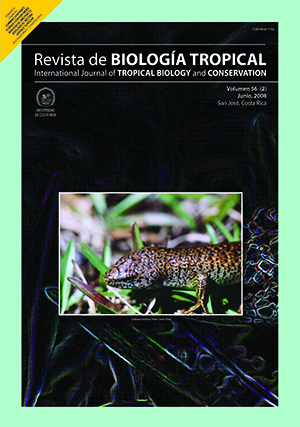Abstract
The effect of forest exploitation – timber and palmito(Euterpe edulis, Palmae) extraction - on structure, diversity, and floristic composition of forests known as palmitals of the Atlantic Forest of Argentina was analyzed. These palmitals are located in Misiones (54 °13’ W and 25°41 ́ S). Three 1 ha permanent plots were established: two in the “intangible” zone of the Iguazu National Park (PNI), and another in an exploited forest site bordering the PNI. Three 0.2 ha non-permanent plots were also measured. One was located in the PNI reserve zone where illegal palmito extraction occurs. The other two were in logged forest. All trees and palmitos with DBH> 10 cm were identified and DBH and height were measured. For each of the six sites, richness and diversity of tree species, floristic composition, number of endemic species, and density of harvestable tree species were estimated. The harvest of E. edulis increases density of other tree species, diminishing palmito density. Forest explotation (logging and palmito harvest) is accompanied by an increase in diversity and density of heliophilic species, which have greater timber value in the region. However, this explotation also diminishes the density of palmito, of endemic species which normally grow in low densities, and of species found on the IUCN Red List. Results suggest that forest structure may be managed for timber and palmito production. The “intangible” zone of the PNI has the greatest conservation value in the Atlantic Forest, since a greater number of endemisms and endangered species are found here.

This work is licensed under a Creative Commons Attribution 4.0 International License.
Copyright (c) 2008 Revista de Biología Tropical

